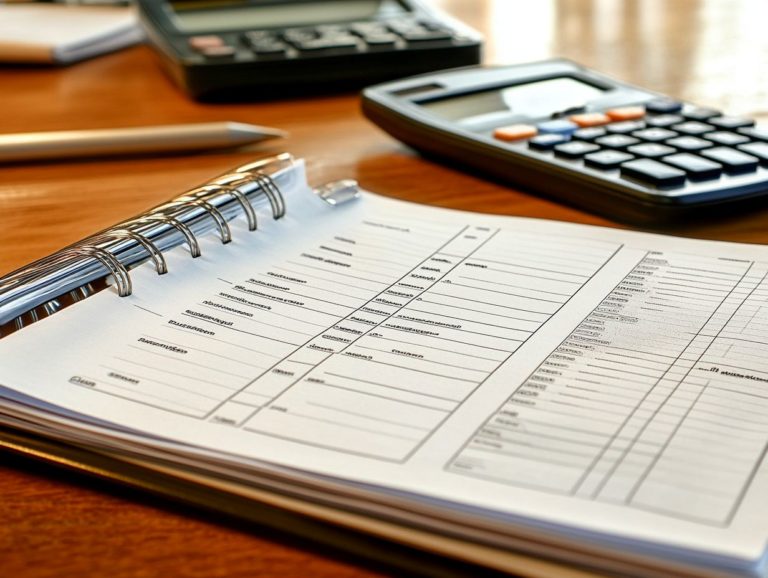What Is the Purpose of an Emergency Fund?
Life presents a myriad of unexpected twists and turns. Establishing an emergency fund serves as your financial safety net during challenging times.
This article delves into what an emergency fund truly is and why it holds significant importance. You ll discover compelling reasons to build one, along with practical strategies to boost your savings.
It also addresses the right moments to dip into your fund and examines alternatives for sustaining your financial security.
Get ready to protect your financial future!
Contents
Key Takeaways:
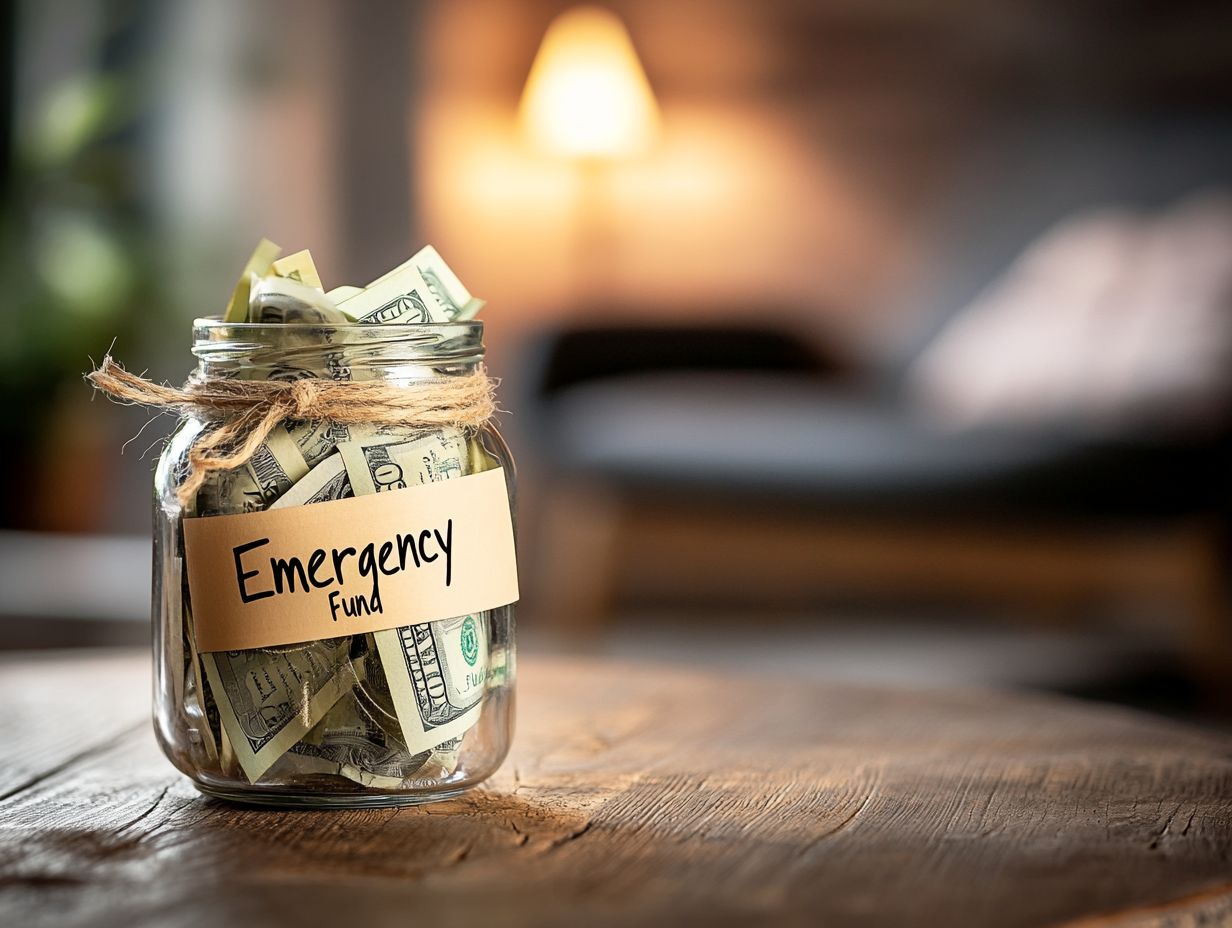
- An emergency fund provides financial security and peace of mind during unexpected situations.
- It serves as a safety net for unforeseen expenses and helps avoid debt and financial stress.
- Building an emergency fund may require sacrifice and discipline, but the benefits far outweigh the effort.
Essentials of Emergency Funds
An emergency fund is a critical financial safety net, designed to offer stability during unforeseen expenses like job loss or medical emergencies. Think of it as a protective buffer that enables you to cover your living costs without falling into debt, especially during financial strain.
Establishing an emergency fund is vital for personal finance. It eases the anxiety tied to unexpected income fluctuations and spending surprises, ensuring you maintain financial security when it matters most.
Definition and Importance
Emergency savings are funds set aside for unexpected financial curveballs, helping you maintain a robust financial plan. These funds differ from regular savings accounts, which are typically earmarked for planned expenses like vacations or home purchases.
Emergency savings act as your financial safety net, granting you peace of mind and reducing the temptation to lean on credit cards or loans during challenging times think job loss, medical emergencies, or surprise home repairs.
Using strategic budgeting methods can effectively allocate your income. For example, the 50/30/20 rule ensures a dedicated portion goes straight into your emergency savings. Using high-yield savings accounts can also boost your savings, offering competitive interest rates that allow your funds to grow while remaining accessible.
Why You Need an Emergency Fund
Establishing an emergency fund is crucial for attaining financial stability. It serves as your safety net against unforeseen expenses, whether it’s an unexpected dental bill, an auto repair, or more significant shocks like job loss or healthcare costs.
Benefits and Advantages
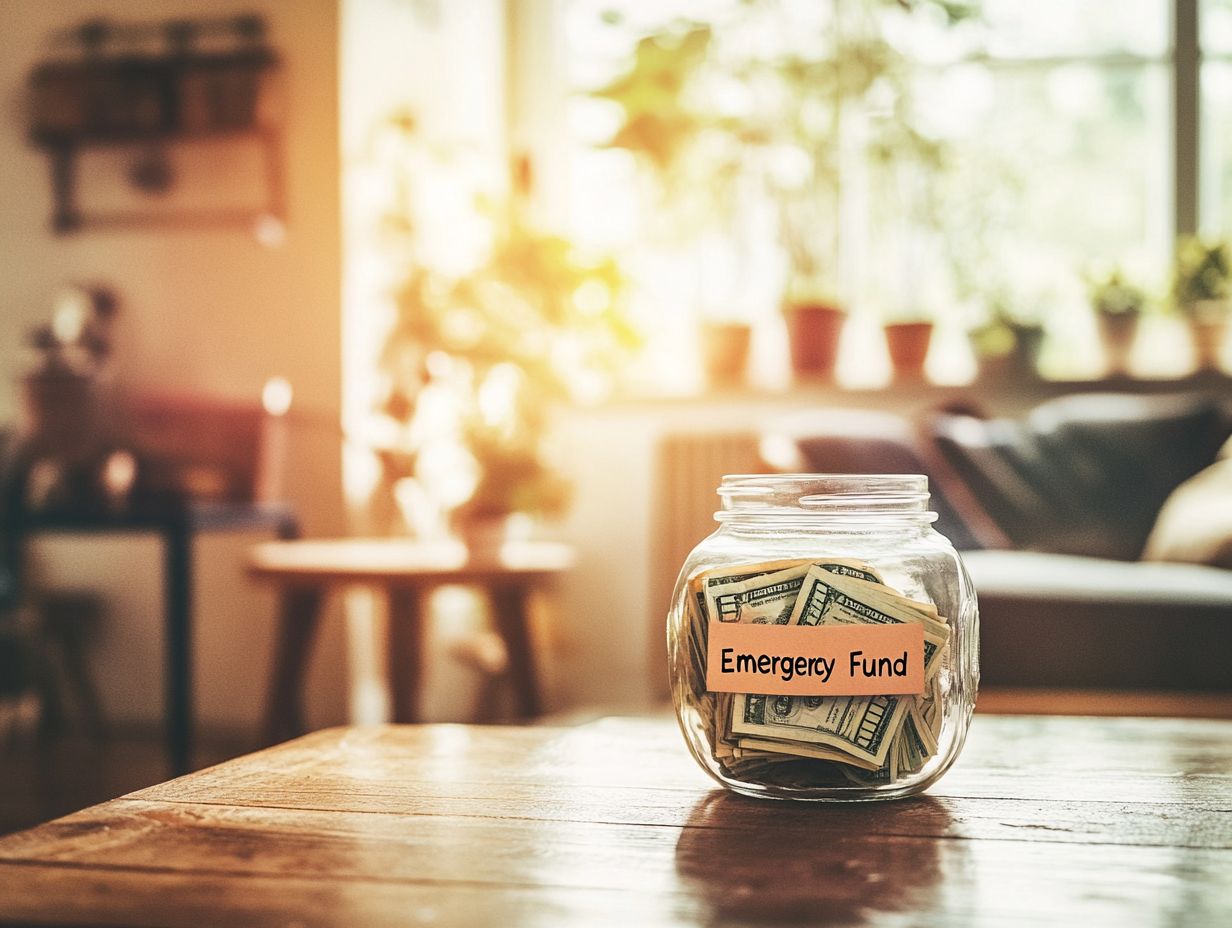
The benefits of maintaining an emergency fund extend beyond financial security. They enable you to navigate financial emergencies with ease during job transitions, healthcare needs, and unexpected cash flow disruptions.
When you have a robust emergency fund, you can sidestep high-interest debt that can quickly accumulate when unforeseen expenses arise. Most Americans encounter three financial emergencies each year, making this fund truly invaluable.
Financial educator Suze Orman captures it perfectly when she says, “Emergency funds are not just hedges against unforeseen circumstances; they are a pathway to peace of mind.” With an emergency fund, you can transition between jobs with confidence, knowing you have a financial cushion to lean on during uncertain times.
This flexibility is especially crucial when dealing with healthcare issues, where unexpected medical expenses can create a significant strain. Financial coach Christine Luken advises that “having three to six months’ worth of living expenses saved can drastically reduce stress during challenging times.” Having that cushion allows you to face life s surprises with poise.
How to Build an Emergency Fund
Creating an emergency fund demands a thoughtful strategy. You ll want to establish clear savings goals and pinpoint effective saving techniques that enhance your financial security over time.
Strategies and Tips for Saving
Effective strategies for saving can greatly enhance your ability to accumulate funds in an interest-bearing savings account. This ensures you have a robust emergency fund for any unforeseen expenses.
Adopting the 50/30/20 budgeting rule can be immensely beneficial. This rule divides your income into essential needs, wants, and savings. It promotes disciplined spending and allows you to target your savings, helping you prioritize your financial goals.
Setting up recurring deposits into your savings account can automate the process. This makes it easier to build your fund without the temptation to spend extra cash. Regularly tracking your expenses is also essential. It reveals areas where you can cut back and fosters a deeper understanding of managing your money.
By implementing these methods, you’ll find financial planning becomes a far more straightforward and effective endeavor.
When to Use Your Emergency Fund
Understanding when to tap into your emergency fund is crucial for preserving your financial stability. Life often throws curveballs, whether it’s a job loss, a medical emergency, or unexpected home repairs that require immediate financial attention.
Recognizing these situations ahead of time enables you to navigate challenges without compromising your long-term financial health.
Common Scenarios and Examples
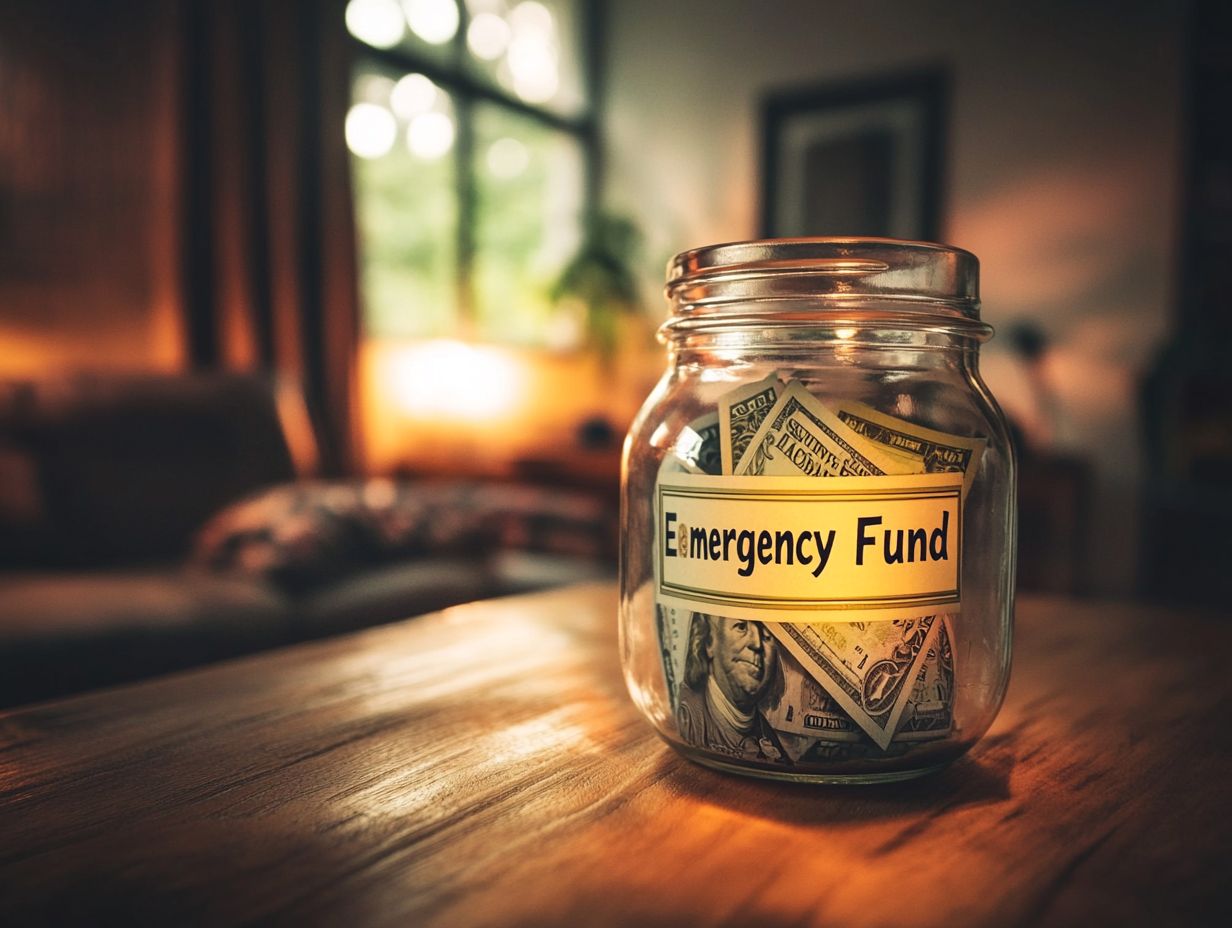
Common scenarios where tapping into your emergency fund becomes essential include unexpected dental bills, auto repairs, or urgent healthcare needs that could lead to significant financial distress.
Imagine your car suddenly breaks down, leaving you stranded and in dire need of repairs. Without those emergency savings at your fingertips, you might rely on high-interest credit cards, setting the stage for a debt spiral that worsens over time.
Now, consider a sudden health issue, like an unexpected surgery. If not addressed promptly, it can lead to mounting medical bills. Not having an emergency fund in these situations can turn a minor setback into a full-blown financial crisis. This shows why it’s crucial to have emergency funds ready.
Timely access to emergency funds isn’t just a luxury; it’s a vital safety net that protects your overall financial health.
Alternatives to an Emergency Fund
While an emergency fund serves as an essential financial safety net, you may also want to explore alternatives. Consider options such as cash investments, lines of credit, or leveraging credit cards for short-term financial needs.
Each choice offers a unique approach to managing unexpected expenses while maintaining your financial health.
Other Financial Safety Nets
Other financial safety nets worth considering include leveraging a credit card to manage cash flow, using an IRA for early access to funds, or exploring personal loans for urgent financial emergencies.
These options can prove invaluable when traditional emergency funds aren’t enough. Depending on your circumstances, these tools can serve as substitutes or complementary resources to bolster your financial security.
While credit cards can provide quick access to funds, they often come with higher interest rates. It’s essential to use them wisely. Withdrawing from an IRA (Individual Retirement Account) may entail penalties unless you’re in an eligible situation. Prudential Financial emphasizes crafting a robust financial plan that incorporates these safety nets, ensuring you don t compromise your long-term financial health in moments of immediate need.
Frequently Asked Questions
Here are some common questions about emergency funds:
- What is an emergency fund? An emergency fund is a savings account set aside for unexpected expenses.
- How much should I save in my emergency fund? Most experts recommend having three to six months’ worth of living expenses saved.
- When should I use my emergency fund? Use your emergency fund for unexpected expenses like medical bills or car repairs.
Start building your emergency fund today. Remember, being prepared can make all the difference in maintaining your financial stability!
What Is the Purpose of an Emergency Fund?
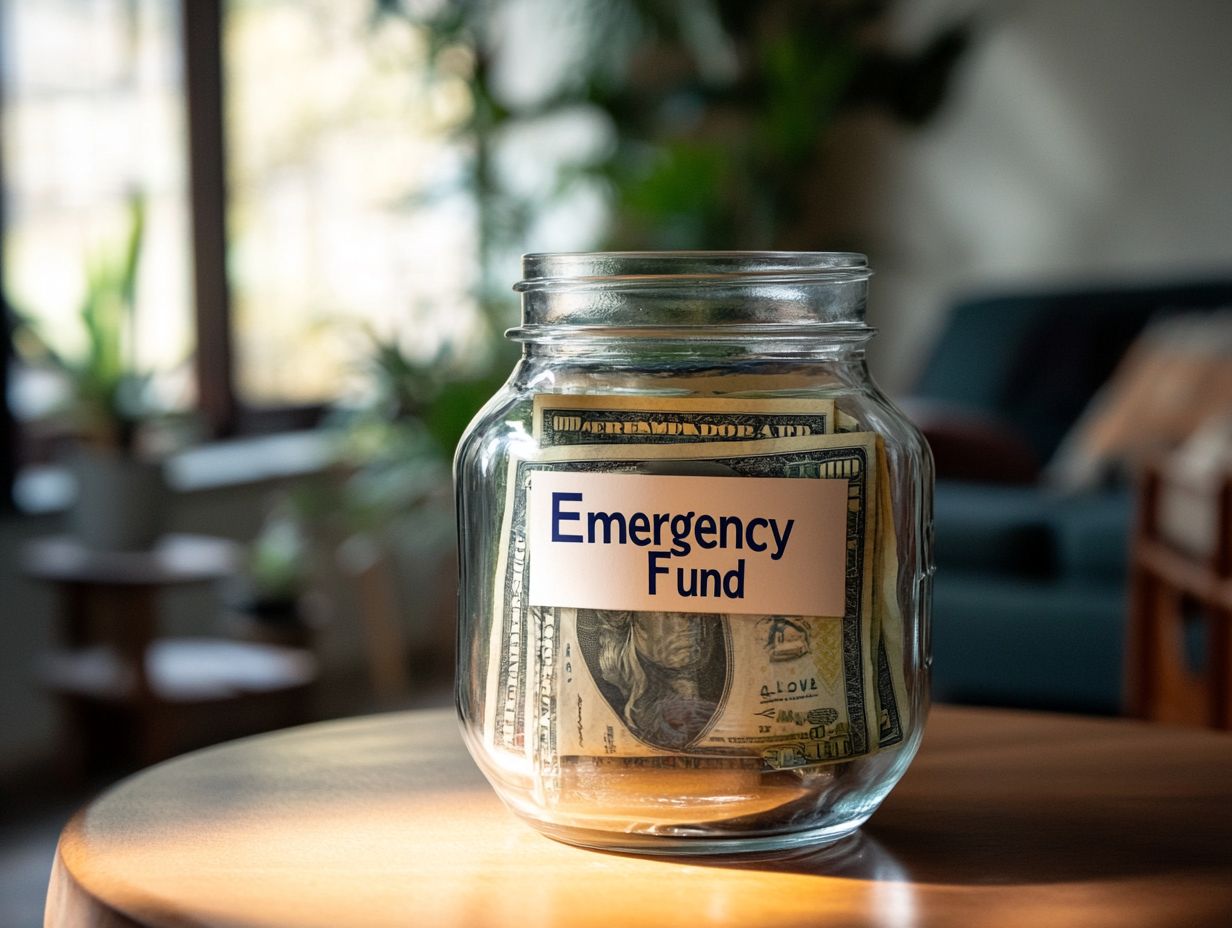
The purpose of an emergency fund is to provide financial security. It helps you manage unexpected expenses or income loss.
Why Is Having an Emergency Fund Important?
An emergency fund is vital for handling sudden financial situations. This fund helps you avoid debt and financial struggles.
How Much Money Should I Have in My Emergency Fund?
Financial experts recommend saving three to six months’ worth of living costs. The exact amount will depend on your personal situation.
What Types of Expenses Can an Emergency Fund Cover?
Your emergency fund can tackle unexpected expenses like medical bills or car repairs! It also covers job loss and other urgent financial needs.
Do I Need an Emergency Fund if I Have Insurance?
Insurance can help with some unexpected expenses but may not cover everything. An emergency fund provides extra financial support and helps you avoid credit cards or loans.
Can I Use My Emergency Fund for Non-Emergency Expenses?
No, keep your emergency fund strictly for urgent situations. Make sure to have another savings account for everyday costs!



